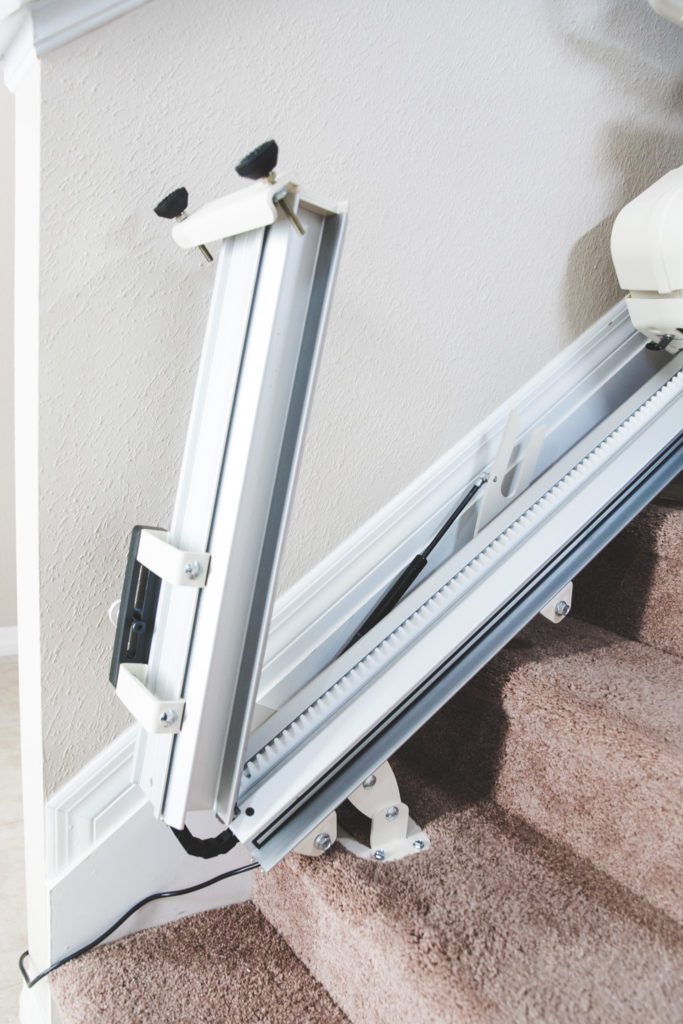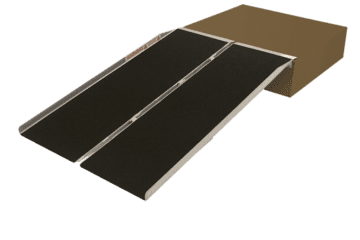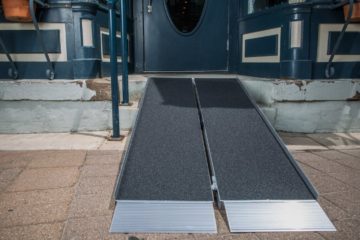To increase home safety, Lehigh Valley seniors, caregivers, and their families should consider a stairlift / chair glide rail that folds up, flips up, and is retractable to eliminate tripping hazards. Not every home or staircase is ideal for a stair lift, for example, the bottom rail may stick out at the foot of the stairs and cause a tripping hazard. But, simple features on a stair lift like a folding rail for a stair lift can make the stair glide safe for all. See the video.
Fold Up Rail / Retractable Rail / Flip Rails
One of the biggest concerns most people have before installing a stair lift at home is the space the device will occupy. No one wants a bulky piece of equipment blocking the entire household’s access to the main stairway.
The good news is you don’t need to worry about your stairlift creating a dangerous obstacle for your family and caregivers. Many stair lifts today come with foldable foot and armrests. They also have seats that fold up and out of the way when the lift is not in use. You can also upgrade to a model with a foldable rail to make your stair lift even safer.
How a Foldable Rail Operates
So that people can get safely on and off, a stair lift must come to a stop a few inches above the floor at the bottom of the staircase. To allow the lift to stop in the correct spot, the rail extends on the floor. A foldable rail only extends when the lift comes down the stairs. Otherwise, it either folds over and lies flat on top of the rail or folds into an upright position. Unless you install your stairlift in a back hallway where no one else uses the stairs, you’ll want to make sure the rail doesn’t stick out and create a safety hazard. First, check with your dealer and ask how far the rail will extend beyond the bottom stair. Once you determine you need a foldable rail, you’ll want to consider whether you should go with a manual or a mechanical style folding rail.

Manual vs. Mechanical Folding Rails
The decision about adding a manual or mechanical folding rail to your stair lift depends mainly on your ability to bend down and fold the rail or use your foot. If you can raise and lower the rail safely, or your caregiver can do it for you, the manual style will work just fine. People living with mobility issues often can’t operate a manual lift. They may not have enough strength, or they may also deal with impaired balance. A mechanical or power folding rail then becomes the optimum solution. Mechanical folding rails work in one of two ways: you either press a button to raise and lower the rail, or the stairlift does it automatically by way of sensors. The model of your stairlift determines whether you’ll have to lower the rail yourself.
Why Buy a Folding Stairlift Rail?
In addition to concerns about space, some people also worry about appearances. Will a stairlift distract guests as soon as they come through the front door? The design of a folding stair lift makes it inconspicuous. When not in use, the seat folds up flush against the back of the chair. Arm and footrests flip up as well, reducing the total footprint of the lift. Once you tuck everything up neatly, your guests will barely notice the stairlift. Something else you’ll appreciate about the foldable stairlift pertains to safety. You already understand the value of a safe way to go up and down the stairs in your home. The foldable components of a lift make your stairway safer for other members of your household. Instead of worrying about whether they’ll trip on the footrest or get stuck between the seat and the doorframe in the upstairs hallway, they can quickly fold things up, ensuring ample space to walk up and down the stairs.
If you live in Allentown, Bethlehem, Easton, Macungie, Schnecksville, Whitehall, Coopersburg, Quakertown, Kutztown, Northampton, Emmaus, Catasauqua, Nazareth or other Lehigh Valley locations, then call Power Stair Lifts for a free in-home estimate. We are independently owned and operated, we are not a franchise, and our mission is to serve our neighbors and community. Click through our sites and web pages at powerstairlifts.com or call (484) 215-3232 to schedule for free home assessment and estimate.

